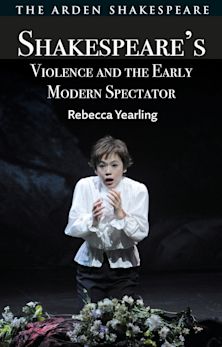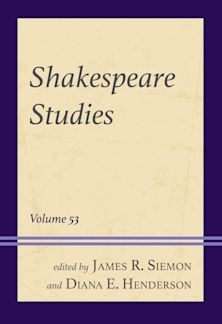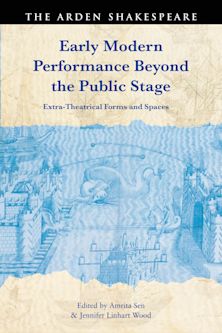Classicizing Shakespeare
Jean-François Ducis and the First European Adaptations
Classicizing Shakespeare
Jean-François Ducis and the First European Adaptations
This product is usually dispatched within 1 week
- Delivery and returns info
-
Free US delivery on orders $35 or over
Description
This book explores the nature and wide-ranging impact of the work of Jean-François Ducis (1733-1816), the first adaptor of Hamlet and of five other Shakespeare tragedies for the French theatre.
Jean-François Ducis is anything but prominent in the histories of Shakespeare adaptation, yet he was pivotal in introducing French and European audiences to Shakespeare's plays on the stage. His Hamlet, tragédie imitée de l'anglais, performed at the Comédie française in 1769, was the first representation of a Shakespeare play on a French stage and was still performed in 1851. Despite his total ignorance of English, Ducis also adapted Romeo and Juliet, Macbeth, King Lear, King John and Othello, playswhich were then translated, like his Hamlet, into a number of European languages.
Classicizing Shakespeare studies Ducis's Shakespearean corpusin the context of the neoclassical climate which, a century earlier, had set off a wave of adaptations in England. Within the wider picture of the European representation of Shakespeare on the stage from 1660 to 1850, the study of Ducis's emblematic case sheds further light on the rationale of these English adaptations as well as on the reception of Shakespeare's plays in most Continental countries well into the 19th century. Willems' rich contextual study demonstrates why the translations of Ducis's own 'imitations' were instrumental in exporting Shakespeare all over the Continent. Through attention to the professional relationship with the renowned actor, François-Joseph Talma, Classicizing Shakespeare reveals too how collaborative practices in the theatre impact on the evolution of a text.
Table of Contents
Note on the Text/Translation
List of Abbreviations
Preface
Acknowledgements
Introduction. Classicizing Shakespeare
1. From Criticism to Adaptation
2. Jean-François Ducis
3. Hamlet
4. Roméo et Juliette
5. Le roi Lear
6. Macbeth
7. Jean Sans Terre ou la mort d'Arthur
8. Othello
9. Appropriation
10. The Construction of a European Shakespeare
Notes
References
Index
Product details

| Published | Jan 08 2026 |
|---|---|
| Format | Hardback |
| Edition | 1st |
| Extent | 248 |
| ISBN | 9781350337824 |
| Imprint | The Arden Shakespeare |
| Illustrations | 3 bw illus |
| Dimensions | 9 x 5 inches |
| Series | Shakespeare and Adaptation |
| Publisher | Bloomsbury Publishing |
Reviews

ONLINE RESOURCES
Bloomsbury Collections
This book is available on Bloomsbury Collections where your library has access.




































